
Linux is the future of computing.
Every old computer that is discarded simply because it is “outdated”, despite being functional, is adding to the growing pile of electronic waste, or e-waste as it is popularly known. Linux is a robust and secure alternative.
Just because a computer has old specs does not mean that it is past its optimum life span. As long as it has some juice left in it, it can continue to serve you quite well. The problem lies in the fact that Operating Systems are continuously being upgraded. The more updated they are, the more bloated their code becomes and the more computing power it requires. Not to forget the fact that an outdated Operating System also has gaping security holes and continuing to use an outdated OS is like putting your vulnerability on display. This is the reason why most people eventually need to upgrade their hardware, whether they like it or not.
A case in point is Windows XP. Or even Windows 7. Official support for these Operating Systems ended long ago and more and more users were compelled to switch to Windows 10. The problem is that not all hardware supports Windows 10. You need a minimum of 2GB RAM to be able to run Windows 10 32-Bit. However, this only gives you a basic performance and the machine slows down. In many cases, the only solution may be to upgrade to a newer hardware that supports Windows 10 for optimum performance.
But What Happens To The Older Hardware?
If the hardware is upgradeable, it should be upgraded so that it can continue to run Windows 10. The problem arises when the hardware is not upgradeable. In such cases, the most common solution is to discard the old hardware and buy new one. And this is a HUGE problem, because the e-waste continues to pile up. Studies indicate that only 10% of the generated e-waste is ever recycled, and 90% of it ends up in landfills, and some of it is illegally dismantled and traded. The non-recycled e-waste is a huge cause of concern for the environment.
Linux For A Greener Environment
So how exactly does Linux contribute to the environment, you may well ask. The answer is simple. Many Linux distributions, or distros as they are called, are lightweight and can run on the older hardware that you are probably thinking of discarding. In fact, most Linux variants do not even need to be installed – you can run them off a USB drive. However, even when installed, they are fast even on that older hardware that Windows lags on. While a minimum of 2GB of RAM is good to have, there are distros which will run on 750 MB of RAM as well. Each PC that you load Linux on instead of discarding is a PC that doesn’t add to the e-waste.
But Will Linux Be Good For Office Work?
Doesn’t Linux require a good knowledge of the command line interface? Well, yes and no. Gone are the days when Linux required an in-depth knowledge of the command line. The distros of today have excellent Graphical User Interfaces or GUIs as they are referred to. The result is that you have an operating system which is similar to Windows or Mac in terms of look and feel. In fact, many of them can even be customized to look like Windows or Mac so you would feel right at home using them.
Most distros also come with free Open Source substitutes like Libre Office where you will find a complete office suite that is similar to the all-pervasive MS Office. Libre office and other Open Source equivalent software allows you the same capabilities as Microsoft Office, which includes Word, Excel Spreadsheets and Presentations. These open-source variants are good enough to meet your day-to-day requirements of office work. It would just take you a couple of days to get familiar with them.
A More Secure System
Did I mention that Linux is considered to be a more secure system than Windows? As a matter of fact, you can use this operating system without the need to install a separate anti-virus program. While it would be wrong to say that there are no viruses out there that affect Linux, the fact remains that there are very few of them. Most viruses are designed for Windows. The fact is that there are so many variants and distros of Linux, someone trying to write a virus program for Linux would have a might tough time trying to decide which distro to target.
Need More Info? Get In Touch today!
Should you have any queries, or should you require a quote from our side for any customized requirement, please do not hesitate to contact us right away.